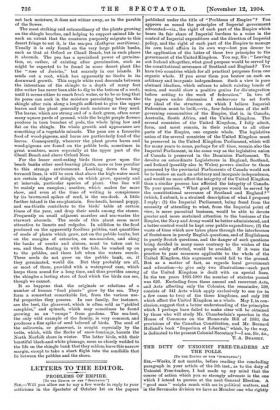SIR,-Will you allow me to say a few words in
reply to your criticisms in the Spectator of October 1st on the papers
published under the title of "Problems of Empire" P You approve as sound the principles of Imperial government advocated—viz., the right of each part of the Empire which bears its fair share of Imperial burdens to a voice in the control of Imperial expenditure and the direction of Imperial policy, and the right of each part of the Empire to manage its own local affairs in its own way—but you demur to the application of the latter of these two principles to the government of the United Kingdom. You say, Sir : " Leaving out Ireland altogether, what good purpose would be served by the constitutional severance of Scotland and England ? You have two countries which for all practical purposes form one organic whole. If you sever them you bestow on each an arbitrary and inorganic independence. Such a view is pure abstract idealism, which refuses to admit existing bonds of union, and would show a positive genius for dis;ntegration before setting to the work of federation." In two of the papers under discussion I endeavour to set forth my ideal of the structure on which I believe Imperial Federation must be built,—viz., four federations of the self- governing communities of the Empire, that is, in Canada, Australia, South Africa, and the United Kingdom. The several countries of the United Kingdom, I fully admit, form, and must remain, in their relation to all other parts of the Empire, one organic whole. The legislative union of the several countries of the United Kingdom must be preserved in the United Kingdom Parliament, which will for many years to come, perhaps for all time, remain also the Imperial Parliament, in the same way as the legislative union of Canada is preserved in the Dominion Parliament. To devolve on subordinate Legislatures in England, Scotland, and Ireland (possibly also in Wales) powers similar to those possessed by the provincial Parliaments of Canada would not be to bestow on each an arbitrary and inorganic independence, and would no more affect the integrity of the United Kingdom than a similar process has affected the integrity of Canada. To your question, " What good purpose would be served by the constitutional severance of Scotland and England ? " (which, I submit, is a strained description of what I propose) I reply : (1) the Imperial Parliament, being freed from the necessity of attending to what, from the Imperial point of view, is mere parochial business, would be able to devote greater and more sustained attention to the business of the Empire, the Navy and Army would be better administered, and a better control would be kept over public expenditure; (2) the waste of time which now takes place through the interference of Scotchmen in purely English questions, and of Englishmen in purely Scotch questions, and the danger of such questions being decided in many cases contrary to the wishes of the people solely affected, would be avoided. If it were the practice to pass measures applicable to the whole of the United Kingdom, this argument would fall to the ground. But as a matter of fact, as regards local government and education—to give only two illustrations—each part of the United Kingdom is dealt with on special lines. In the ten years 1891-1900 the number of statutes passed was 626. Excluding from these annual and recurrent Acts, and Acts affecting only the Colonies, the remainder, 529, consists of 341 Acts which apply exclusively to one (or in a few cases to two) of the three kingdoms, and only 188 which affect the United Kingdom as a whole. May I, in con- clusion, suggest that a better understanding of the principles which I perhaps have failed to make clear will be obtained by those who will study Mr. Chamberlain's speeches in the House of Commons on the Home-rule Bill of 1886, the provisions of the Canadian Constitution, and Mr. Bernard Holland's book " Imperium et Libertas," which, by the way, is dedicated to the present Colonial Secretary P-1 am, Sir, &c.,
T. A. BRASSEY.
THE DUTY OF UNIONIST FREE-TRADERS AT THE POLLS.










































 Previous page
Previous page